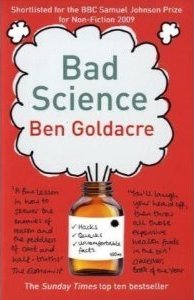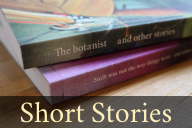4th estate, 2008
Conclusion Ben Goldacre is on a mission to teach us about how scientific evidence is systematically ignored, manipulated, misinterpreted, fabricated, and otherwise molested. “Bad Science” is both funny and alarming. It's a recommended read for … anybody, really.

Ben Goldacre is a man on a mission. He wants to teach the general public about science. About what it is: Careful interpretation of results from properly conducted experiments. But most of all, Goldacre wants to teach us what science is not about: Unquestioningly accepting unsubstantiated claims from authoritative figures.
 The book starts out lightly, describing
fairly innocuous cases of bad science. For example, Aqua Detox is
a treatment for getting rid of all the toxins that accumulate in your
body throughout your life (or something along those lines).
Essentially, the treatment consists of putting your feet into a bath
of salt water, through which a small electrical current flows. The
effectiveness of the treatment is obvious: The water turns brown and
a foul smell is released—clear evidence of toxins leaving your
body, right? In actuality, the brown color is due to rusting
electrodes and the smell is the result of chlorine being released
from the water. Both are the result of electrolysis and occur
regardless of whether you have put your feet in the bath or not (if
you are interested you can work out the details for yourself with a
little high-school level chemistry). I think this is pretty funny,
because a) you're an ass if you believe this stuff and b) you won't
get hurt even if you do.
The book starts out lightly, describing
fairly innocuous cases of bad science. For example, Aqua Detox is
a treatment for getting rid of all the toxins that accumulate in your
body throughout your life (or something along those lines).
Essentially, the treatment consists of putting your feet into a bath
of salt water, through which a small electrical current flows. The
effectiveness of the treatment is obvious: The water turns brown and
a foul smell is released—clear evidence of toxins leaving your
body, right? In actuality, the brown color is due to rusting
electrodes and the smell is the result of chlorine being released
from the water. Both are the result of electrolysis and occur
regardless of whether you have put your feet in the bath or not (if
you are interested you can work out the details for yourself with a
little high-school level chemistry). I think this is pretty funny,
because a) you're an ass if you believe this stuff and b) you won't
get hurt even if you do.
From these obvious forms of quackery, Goldacre moves on to homeopaths, nutritionists and alternative medicine practitioners. Clearly, some diets are better than others (you can see this, for example, in the amusing documentary “Super Size Me”) and, in some cases, you may benefit from particular food supplements. But Goldacre reminds us of a few facts: Homeopathy is utter nonsense and most of the things that nutritionists say are nonsense as well: Eating spinach does not directly oxygenate your blood and oranges without vitamin C do not exist. Goldacre suggests that nutritionists (which, by the way, is a meaningless and unprotected term in most countries, unlike, for example, “dietist”) devise elaborate and pseudo-scientific diets, because the simple advise to eat healthy and varied doesn't make any money. Essentially, nutrionists use bad science to prevent people from discovering that they are redundant.
Although alternative medicine does not, as a rule, cause much harm, there are some gruesome exceptions. Here in the Netherlands, for example, a national celebrity stopped (or never started in the first place, I'm not sure) her treatment for cancer after a “spiritual medium” convinced her that she was suffering from a bacterial infection which should be treated using alternative medicine. She died. It would be unfair to say that the medium killed her, since she might have died even if she had received proper treatment, but her chances of survival were definitely greatly reduced. Right now you may be thinking that people have their own responsibility: Even if someone (who is not your doctor) tells you to stop chemotherapy, you can and should know better, because reliable information about cancer is readily accessible. And I would agree. Which is why I found the following example particularly disturbing.
In South Africa, under the reign of Mbeki, there were many “AIDS dissidents” who denied the link between HIV and AIDS. This is tragic, but not always and necessarily due to malevolence. Many poor Africans understandably hold a grudge against the wealthy western world (perhaps particularly in South Africa, where memory of “apartheid” is still fresh) and they have cultivated the belief that AIDS is actively spread by western pharmaceutical corporations to make money by selling antiretroviral drugs. And, of course, pharmaceutical companies do make money by selling these drugs. I wouldn't even necessarily put it beyond them to infect people with AIDS (although I doubt it), but this is beside the point: If you are infected with HIV you need antiretroviral drugs or you will develop AIDS and die. So, if you know better, you should try to convince AIDS dissidents that they are wrong. What you should not do, is post full-page adverts in South African newspapers saying things like “Stop AIDS genocide by the drug cartel”. Why would someone do that, you ask? Well, they might be selling a multivitamin food supplement, which is “the natural solution to AIDS”. Which is exactly what Matthias Rath has done. By promoting his vitamin pills as the treatment for AIDS (not a complementary treatment, mind you, the treatment) he has caused indescribable damage to the South African society and unbelievable personal suffering. You can say the same of former president Mbeki, but he may plead ignorance (I honestly don't know what he must have been thinking). Matthias Rath, who has a medical degree, can not.
Rath has sued Ben Goldacre for libel, to prevent him from publishing his chapter on the multivitamin natural solution to AIDS. Fortunately, Goldacre has won this case and he has made the chapter, which was not part of the first edition of "Bad Science", freely available. You can read the full chapter here.
Well, it's time to wrap up this book review, before it escalates into a full blown political statement. As you will have guessed by now, I really liked the book. It was amusing (e.g., the Aqua Detox hoax), sometimes exasperating (e.g., the chapter on Matthias Rath) and frequently enlightening. Although a mission is a dangerous thing for a writer to have, Goldacre does not fall into the trap of becoming a zealot. He simply examines experimental results, provides the relevant references, and points out weaknesses in the overstated claims of others.
On a slightly less positive note, some parts of the book lack a clear structure and are somewhat repetitive. His staccato and personal writing reads a bit like a series of blogs or columns, which is not terribly surprising, since Goldacre is a columnist for the Guardian. Another of point of criticism is that the book frequently, and without introduction, refers to typically British terms and personalities. For example, if you are not from the UK you may not immediately understand a passing reference to the MMR scare, and you may not be familiar with the delicious (and healthy!) recipes of Gillian McKeith.
But these are small gripes. Overall, “Bad Science” is one of the most riveting books I've read in some time. Also, and I hate to say these types of patronizing things, it's important that people are made aware of these issues. Because, as pseudo-scientists say pseudo-mathematically: ScienceBad → Happen(Bad_Things)
Get this book on amazon.com
, amazon.co.uk
or bol.com.



